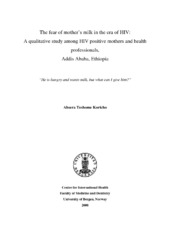| dc.description.abstract | Background: Breastfeeding remains normative and vital for child survival in the developing world. However, the knowledge of HIV transmission through breastfeeding has become an enormous public health dilemma, and has brought to the forefront of attention the controversy linked to whether breastfeeding can safely be promoted in high HIV epidemic areas. Exclusive replacement feeding can fully prevent postnatal transmission of HIV infection in children, however, it is neither acceptable nor a feasible option in the developing world. As a result of the dilemmas linked to infant feeding among HIV positive women, the World Health Organization in 2001 published a set of guidelines that promoted modified infant feeding alternatives for HIV positive mothers, where mothers were advised to avoid all breastfeeding if it replacement feeding was acceptable, feasible, affordable, sustainable and safe. To our knowledge, no studies have qualitatively explored the challenges of HIV positive infant feeding women and health professionals who are counselling HIV positive women on infant feeding choices in a context where mothers' milk has been increasingly feared as safe nutrient for a baby.Aim: This study aimed at exploring the experiences of HIV positive mothers and their counsellors related to infant feeding choices and adherence to the chosen infant feeding methods in the context of PMTCT programs.Methods: The study was conducted in two governmental hospitals in Addis Ababa, Ethiopia, from June to August 2007. Qualitative data triangulation was used as a means of data collection. A total of 32 in depth interviews were conducted with 14 HIV positive mothers who chose breastfeeding, 8 HIV positive mothers who practiced replacement feeding, and 10 health professionals (counsellor nurses, and paediatricians) working in the infant feeding clinics. Participant observation and two case studies were also included. All interviews were audio recorded, transcribed and translated from Amharic to English. Manual data coding, categorizing and thematic analysis was performed to draw up on the emerging themes. The research received ethical clearance from the Regional Ethical Clearance Committee of the Addis Ababa Regional Health Bureau, Ethiopia. All informants gave oral informed consent.Results: All informants expressed their fear of breast milk, and the way they handled the infant feeding situation was strongly influenced by this fact. The infant feeding choices and practices of the HIV positive mothers in the study were moreover strongly influenced by the health professionals' advice, the immense fear of disclosure of their HIV status, and the related social surroundings. The challenging and continuously shifting WHO guidelines and the corresponding confusion both among counsellors and mother regarding what was optimal feeding alternative for HIV positive women had a great impact on the HIV positive mothers' difficulties in adhering to any of the infant feeding options. Whether HIV positive mothers chose replacement feeding or exclusive breastfeeding, the practice was highly uncommon in the local setting and hence created immense challenges for the women in terms of scrutiny and blame. The guidance and advice given to the HIV positive mothers in the two study hospital settings varied, but in both places, the fear of milk was found to be at the forefront of attention whatever the actual advice given to the... | en_US |
